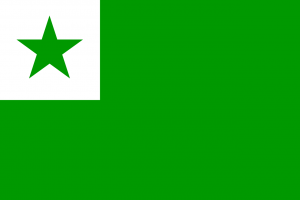Difference between revisions of "Language/Esperanto/Grammar/THE-INTERROGATIVE"
Jump to navigation
Jump to search
(Created page with "thumb <div style="font-size:300%">THE INTERROGATIVE in Esperanto</div> For the interrogative, you start the phrase with *ĉu ....") |
m (Quick edit) |
||
| (One intermediate revision by the same user not shown) | |||
| Line 1: | Line 1: | ||
[[File:Esperanto-Language-PolyglotClub.png|thumb]] | [[File:Esperanto-Language-PolyglotClub.png|thumb]] | ||
<div | <div class="pg_page_title">THE INTERROGATIVE in Esperanto</div> | ||
For the interrogative, you start the phrase with | For the interrogative, you start the phrase with | ||
| Line 11: | Line 11: | ||
*ne, li trinkas = no, he is drinking | *ne, li trinkas = no, he is drinking | ||
==Sources== | ==Sources== | ||
http://esperanto.bretonio.free.fr/dokumentoj/pakeo-en3.pdf | http://esperanto.bretonio.free.fr/dokumentoj/pakeo-en3.pdf | ||
==Other Lessons== | |||
* [[Language/Esperanto/Grammar/Adjectives|Adjectives]] | |||
* [[Language/Esperanto/Grammar/PREPOSITIONS|PREPOSITIONS]] | |||
* [[Language/Esperanto/Grammar/Negation|Negation]] | |||
* [[Language/Esperanto/Grammar/Plural|Plural]] | |||
* [[Language/Esperanto/Grammar/THE-CORRELATIVES|THE CORRELATIVES]] | |||
* [[Language/Esperanto/Grammar/THE-ACCUSATIVE|THE ACCUSATIVE]] | |||
* [[Language/Esperanto/Grammar/THE-PARTICIPLES|THE PARTICIPLES]] | |||
* [[Language/Esperanto/Grammar/Past-Participle-in-Esperanto|Past Participle in Esperanto]] | |||
* [[Language/Esperanto/Grammar/Plurals|Plurals]] | |||
<span links></span> | |||
Latest revision as of 13:15, 27 March 2023
THE INTERROGATIVE in Esperanto
For the interrogative, you start the phrase with
- ĉu ... ?
- ĉu li manĝas? = Is he eating?
- jes, li manĝas = yes, he is eating
- ne, li trinkas = no, he is drinking
Sources[edit | edit source]
http://esperanto.bretonio.free.fr/dokumentoj/pakeo-en3.pdf
Other Lessons[edit | edit source]
- Adjectives
- PREPOSITIONS
- Negation
- Plural
- THE CORRELATIVES
- THE ACCUSATIVE
- THE PARTICIPLES
- Past Participle in Esperanto
- Plurals
